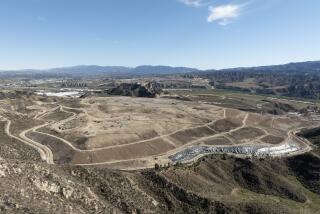Composting Operation to Be Moved From Carson : Sanitation: After years of complaints, the officials will send tons of wet sludge to a remote site in the Coachella Valley.
- Share via
After more than a decade of public outcry over pungent odors and dust, the region’s sanitation district has decided to close a huge composting operation at its 300-acre sewage treatment plant in Carson, sanitation officials confirmed Thursday.
The decision means that the composting, which has taken place at the site for about 60 years, will end this summer. An estimated 1,600 tons of wet sludge now dried and treated each day for compost outside the plant will be hauled to a remote composting site in the Coachella Valley, according to officials of the County Sanitation Districts of Los Angeles, which serves sewer districts from Palos Verdes Peninsula to Pomona.
“This is fantastic. It’s what we’ve been working toward for so long,” said Gertrude Schwab, a longtime Wilmington activist who with her husband, Bill, serves on a sanitation district citizen advisory committee.
For years, the committee and many residents in the harbor area have urged the sanitation district to relocate, treat or enclose the composting operation at the Carson plant, located at Figueroa Street and Lomita Boulevard. The site, they said, had not only left the area with a foul odor but contributed to air quality problems as winds blew dust from the drying sludge beds throughout the residential areas of Carson and Wilmington.
Mindful of the public controversy over its composting site, the sanitation agency pursued several options over the last decade to minimize odors.
But after spending $40 million on environmental studies, new technologies and modifications to the site, sanitation officials Wednesday returned to a conclusion they first reached three years ago: The site must be closed and its operations relocated.
“For the last 10 years, we have undertaken major efforts at the plant. Extensive research. Reducing the compost volume. All in an effort to eliminate the complaints from the community,” said Michael Moshiri, who heads the sewer department for the sanitation district.
Specifically, said sanitation spokesman Don Avila, the agency sealed older tanks at the plant and dramatically cut back on the amount of sludge it turned over to the Kellogg Corp., a manufacturer of soil conditioners that has operated the composting facility since it opened in the 1930s.
Despite those efforts, sanitation officials said, the composting operation continued to be a problem for the agency. And several years ago, Moshiri said, it came to the conclusion that the composting operation was “no longer compatible with the neighborhood.”
Three years ago, he said, the district and Kellogg had planned to close the site and move the operation to the San Joaquin Valley. But that plan fell apart in the face of opposition by farmers in the central valley, he said.
Later, the sanitation district considered enclosing the composting site in silos, as is done by half a dozen sanitation districts on the East Coast, Moshiri said. But after inspecting those sites, he said, local sanitation officials found that the silos “were still plagued with odor problems” for surrounding areas.
Finally, according to Moshiri, the agency opted to close the site and move the composting to the Coachella Valley site in Riverside County, where sanitation districts from Riverside to San Diego already have composting operations. The move will cost the sanitation district an additional $2 million a year.
Sanitation district spokesman Don Avila said: “We finally concluded that the only way we could be a good neighbor to the local (harbor area) communities was to eliminate the composting. . . . We didn’t feel like we could make them wait any longer for a solution.”
Although the decision will significantly reduce odors from the site, Margaret Hudson of Carson said she was more eager to see how the relocation of the composting will reduce the problem of wind-blown dust in her city and Wilmington.
“The sludge has created a dust problem,” said Hudson, who has chaired the citizens advisory committee since 1980. And the decision to close the compost operation, she added, “is going to make the summers a lot more tolerable because that’s when you get the strongest effect of the blowing sludge.”
The relocation of the compost operation, according to sanitation officials, is expected to begin sometime in June and be completed in August.
More to Read
Sign up for Essential California
The most important California stories and recommendations in your inbox every morning.
You may occasionally receive promotional content from the Los Angeles Times.










